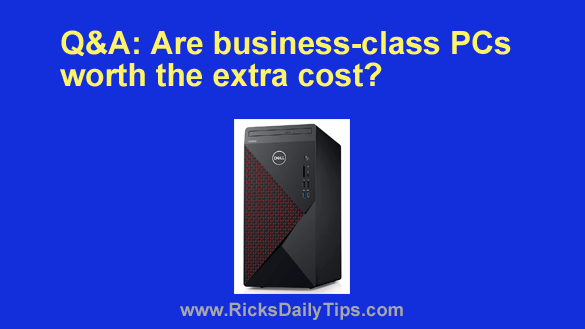 Note: The links in this post are affiliate links.
Note: The links in this post are affiliate links.
Question from Aaron: I recently started shopping for a new desktop PC to replace my beloved Gateway that served me well for over a decade until it got destroyed by lightning.
I was looking at HPs and Dells and noticed something that’s a little confusing to me. Maybe you can clear it up.
Both the HP and Dell websites offer a choice between regular computers and business computers.
I’ve heard that business computers are built better and will last longer, but is that really true?
And even if business computers really are better quality is it worth paying up to double the cost of a regular computer that has similar specs?
Rick’s answer: Those are great questions, Aaron.
First of all, what you’ve heard about business-class PCs being better-built and longer lasting is generally true.
Every manufacturer puts higher quality components inside their business machines, and that necessarily means they have to charge more for them.
What’s more, their business customers also typically receive better tech support and warranty services, and of course that adds to the cost as well.
Now that we’ve established that business-class PCs are indeed higher quality machines, and therefore necessarily higher priced, we’ll move on to your second question…
As is so often the case, the best answer to the question “Are business-class PCs worth the extra cost?” is “maybe”.
The reason I say maybe is because the answer will be different depending on the buyers’ needs and expectations.
I believe this question is best answered by listing the advantages of each class of PC.
First, let’s look at business-class machines…
Business-class PCs are typically aimed at the corporate and business market.
When you’re running a business your primary concern is reliability and stability, not necessarily the fastest machine you can get for the money.
When a business-critical computer goes down that can have a major impact on both productivity and profitability. Therefore it’s important for the machines they use day-in and day-out to experience as little downtime as possible.
And by the way, I include people who work from home in that group as well.
If you need the most dependable PC you can buy within your budget you’d likely be better off purchasing a business class machine instead of a more powerful consumer-grade model (what you referred to as a “regular” PC).
Now, let’s talk about consumer-grade (i.e. regular) PCs…
Most home users tend to be more concerned with getting the fastest PC with the most RAM and storage they can get that’s in line with their budgets, and those people almost always opt for a consumer-grade PC.
While it’s definitely an inconvenience when a home computer goes down, the downtime the user experiences usually won’t cost them anything besides the frustration and the cost incurred when they have the machine repaired or replaced.
Unlike a business which could potentially lose thousands of dollars per day due to computer downtime, the most a typical home user will lose is the cost of a replacement PC.
In short, for many home users it simply makes sense to accept a higher risk of component failure in return for a machine with a faster processor and (perhaps) more RAM and storage space when they can get those benefits at roughly the same price.
So there you have the advantages of the two classes of PCs. But which of those machine types would actually be cheaper in the long run?
Again, the answer depends on the user…
Business and corporately-owned PCs are often used for many years. After all, replacing dozens, hundreds or even thousands of computers results in a massive expense, even when taking corporate discounts into account.
As long as the existing machines are still working as they should there is really no need to replace them.
Home users tend to prefer having the latest and greatest in technology, and that means more frequent “upgrades” either in the form of hardware component upgrades or simply purchasing a new PC.
And since consumer-grade PCs typically cost much less than business machines with similar specs, those folks can afford to “upgrade”more often. That means they’ll almost always have a faster machine than their corporate counterparts.
Bottom line: If quality and reliability is more important to you than getting the most performance for your money, then it makes sense to pay the premium and get yourself a business-class machine.
But if you’re more interested in always having the latest and fastest technology, save some bucks on your next purchase and buy a consumer-grade PC. That way you’ll be be able to afford to upgrade to newer technology more often.